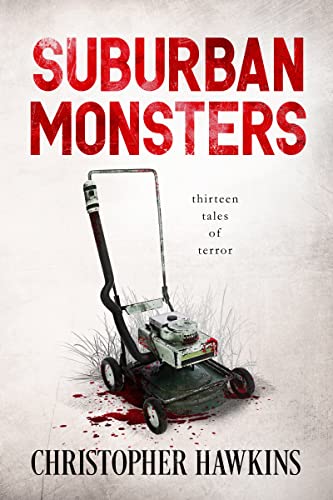
Suburban Monsters received a 4+ star review, making it an IndieReader Approved title.
Following find an interview with author Christopher Hawkins.
What is the name of the book and when was it published?
The book is Suburban Monsters and it releases on March 15, 2023.
What’s the book’s first line?
Danny Chambers said that I was dirty and that I was poor, so I pushed him down on the ground.
What’s the book about? Give us the “pitch”.
Suburban Monsters is a collection of short stories themed around the horrors that might be lurking right next door. It’s ordinary people in extraordinary situations, facing terrors that range from the supernatural to the cosmic to the all-too-human.
What inspired you to write the book? A particular person? An event?
Since this is a collection, it’s hard to point to any one thing that inspired these stories. But childhood (and growing beyond childhood) is a common theme in this book, and a lot of that comes from my own childhood, growing up in Northwest Indiana. There’s no single suburb that ties Suburban Monsters together, but all of them borrow at least a little from the places I lived as a child. There’s a lot of me in those stories, too.
What’s the main reason someone should really read this book?
I wrote this book for readers who, like me, grew up loving the stories of Richard Matheson and Ray Bradbury and Stephen King. I wrote it for everyone who’s ever stayed up late reading under the covers with a flashlight, and watching scary movies with the sound down low so as not to wake anyone else in the house. If that sounds like you, then I think you’ll enjoy this book.
What’s the most distinctive thing about the main character? Who-real or fictional-would you say the character reminds you of?
The great thing about a collection is that there are so many main characters to choose from. Every single one of them grows and changes during the course of their stories. Some find strengths they never knew they had. Some end up destroyed, literally or psychologically. But none of them come out the same on the other side.
When did you first decide to become an author?
I don’t know if there was ever a specific point when I made a conscious choice and said, “I’m going to be a writer.” As a kid, I lived in my own head a lot, and I always had a book (or two, or ten) close at hand. Writing was really just a natural extension of that, and I’ve been doing it ever since I was a teenager.
Is this the first book you’ve written?
It’s the first book I’ve published, but not the first I’ve written. A lot of work gets abandoned or just set aside in the process of honing your craft, and like every writer I have trunk stories. But I also have books that I’m very proud of that haven’t been brought in front of an audience yet. I’m changing that, starting later this year.
How much time do you generally spend on your writing?
As much as I can. It always feels like too much and not enough.
What’s the best and the hardest part of being an indie?
For me, the best part is the ownership I have over my own work. I’m a bit of a control freak, so not having any gatekeepers between my stories and my readers is a big plus. But the flipside of that is: if I don’t do it, it doesn’t get done. So I’ve had to learn a lot about publishing and marketing, and develop a lot of new skills. I get to wear a lot of different hats.
What’s a great piece of advice that you can share with fellow indie authors?
Don’t be too afraid or too proud to ask for help. No one makes it in this business alone.
Would you go traditional if a publisher came calling? If so, why?
If the right deal came along, of course I would. However, it would have to be a deal that helped me grow my career and reach a broader audience. I don’t think I’d ever go traditional just for the sake of being able to say that I was traditionally published.
Is there something in particular that motivates you (fame? fortune?)
Really I just want to write the best stories that I can, and leave my readers with a lasting emotional reaction at the end of them. But I’ve also been known to work for Oreos.
Which writer, living or dead, do you most admire?
There are so many! John Steinbeck leaps to mind. So does Cormac McCarthy. If I’m ever able to write something that approaches their level, I think I’ll be able to die happy.
